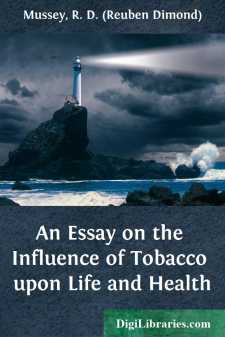Categories
- Antiques & Collectibles 13
- Architecture 36
- Art 48
- Bibles 22
- Biography & Autobiography 813
- Body, Mind & Spirit 142
- Business & Economics 28
- Children's Books 14
- Children's Fiction 11
- Computers 4
- Cooking 94
- Crafts & Hobbies 4
- Drama 346
- Education 46
- Family & Relationships 57
- Fiction 11829
- Games 19
- Gardening 17
- Health & Fitness 34
- History 1377
- House & Home 1
- Humor 147
- Juvenile Fiction 1873
- Juvenile Nonfiction 202
- Language Arts & Disciplines 88
- Law 16
- Literary Collections 686
- Literary Criticism 179
- Mathematics 13
- Medical 41
- Music 40
- Nature 179
- Non-Classifiable 1768
- Performing Arts 7
- Periodicals 1453
- Philosophy 64
- Photography 2
- Poetry 896
- Political Science 203
- Psychology 42
- Reference 154
- Religion 513
- Science 126
- Self-Help 84
- Social Science 81
- Sports & Recreation 34
- Study Aids 3
- Technology & Engineering 59
- Transportation 23
- Travel 463
- True Crime 29
An Essay on the Influence of Tobacco upon Life and Health
Categories:
Description:
Excerpt
ESSAY ON TOBACCO.
In the great kingdom of living nature, man is the only animal that seeks to poison or destroy his own instincts, to turn topsy-turvy the laws of his being, and to make himself as unlike, as possible, that which he was obviously designed to be.
No satisfactory solution of this extraordinary propensity has been given, short of a reference to that—
"first disobedience and the fruit
Of that forbidden tree, whose mortal taste
Brought death into the world and all our wo,
With loss of Eden."
While the myriads of sentient beings, spread over the earth, adhere, with unyielding fidelity, to the laws of their several existences, man exerts his superior intellect in attempting to outwit nature, and to show that she has made an important mistake, in his own case. Not satisfied with the symmetry and elegance of form given him by his Creator, he transforms himself into a hideous monster, or copies upon his own person, the proportions of some disgusting creature, far down in the scale of animal being. Not content with loving one thing and loathing another, he perseveres in his attempts to make bitter sweet, and sweet bitter, till nothing but the shadow is left, of his primitive relishes and aversions. This is strikingly exemplified in the habitual use of the narcotic or poisonous vegetables.
History.
Tobacco is generally regarded as having originated in America. Its name appears to have been derived from Tabaco, a province of Yucatan, in Mexico, from which place it is said to have been first sent to Spain; or, as some assert, though with less probability, from an instrument named Tabaco, employed in Hispaniola in smoking this article.
Cortez sent a specimen of it to the king of Spain in 1519. Sir Francis Drake is said to have introduced it into England about the year 1560, and, not far front the same time, John Nicot carried it to France; and Italy is indebted to the Cardinal Santa Croce for its first appearance in that country.
Traces of an ancient custom of smoking dried herbs having been observed, it has been suggested that tobacco might have been in use in Asia, long before the discovery of America. The fact, however, that this plant retains, under slight modifications, the name of tobacco, in a large number of Asiatic as well as European dialects, renders almost certain the commonly received opinion, that it emanated from this country, and from this single origin has found its way into every region of the earth, where it is at present known. If this be the fact, the Western hemisphere has relieved itself of a part of the obligation due to the Eastern, for the discovery and diffusion of distilled spirit.
Early in the history of our country, the cultivation and use of tobacco were by no means confined to central America. In Hawkins' voyage of 1655, the use of this article in Florida is thus described: "The Floridians, when they travele, have a kind of herbe dryed, which, with a cane and an earthen cup in the end, with fire and the dryed herbes put together, do sucke thorow the cane the smoke thereof, which smoke satisfieth their hunger." Still earlier, viz....


